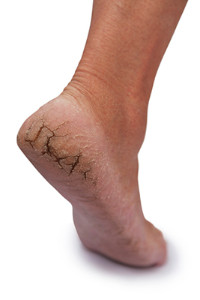 Cracked heels are generally not a serious health concern for non-diabetics. Having said that, they can be a discomforting and even slightly painful issue. Cracked heels are typically caused by dry skin, so making sure to keep your feet hydrated is important. Foot creams can be very helpful in restoring moisture to the feet and helping to keep them moisturized. It is recommended that you drink plenty of water to help keep your body hydrated, which will also help to keep your skin hydrated as well. Maintain a healthy diet, and eat foods that will help keep your body healthy. Try to use soaps or skin products that are mild and do not contain harsh chemicals that can damage your skin. Washing your feet daily will help keep them clean and help prevent any potential bacteria or fungus from infecting your feet. Finally, when you dry your feet, pat them dry instead of rubbing them dry as this can damage skin.
Cracked heels are generally not a serious health concern for non-diabetics. Having said that, they can be a discomforting and even slightly painful issue. Cracked heels are typically caused by dry skin, so making sure to keep your feet hydrated is important. Foot creams can be very helpful in restoring moisture to the feet and helping to keep them moisturized. It is recommended that you drink plenty of water to help keep your body hydrated, which will also help to keep your skin hydrated as well. Maintain a healthy diet, and eat foods that will help keep your body healthy. Try to use soaps or skin products that are mild and do not contain harsh chemicals that can damage your skin. Washing your feet daily will help keep them clean and help prevent any potential bacteria or fungus from infecting your feet. Finally, when you dry your feet, pat them dry instead of rubbing them dry as this can damage skin.
Cracked heels are unsightly and can cause further damage to your shoes and feet. If you have any concerns, contact one of our podiatrists from Sutera and Jones Surgical Podiatry. Our doctors can provide the care you need to keep you pain-free and on your feet.
Cracked Heels
Cracked heels appear unappealing and can make it harder for you walk around in sandals. Aside from looking unpleasant, cracked heels can also tear stockings, socks, and wear out your shoes. There are several methods to help restore a cracked heel and prevent further damage.
How Do You Get Them?
Dry skin is the number one culprit in creating cracked heels. Many athletes, walkers, joggers, and even swimmers suffer from cracked heels. Age and skin oil production play a role to getting cracked heels as well.
Promote Healing
Over the counter medicines can help, especially for those that need instant relief or who suffer from chronic dry feet.
Wear Socks – Wearing socks with medicated creams helps lock in moisture.
Moisturizers – Applying both day and night will help alleviate dryness which causes cracking.
Pumice Stones – These exfoliate and remove dead skin, which allows for smoother moisturizer application and better absorption into the skin.
Change in Diet
Eating healthy with a well-balanced diet will give the skin a fresh and radiant look. Your body responds to the kinds of food you ingest. Omega-3 fatty acids and zinc supplements can also revitalize skin tissue.
Most importantly, seek professional help if unsure how to proceed in treating cracked heels. A podiatrist will help you with any questions or information needed.
If you have any questions, please feel free to contact one of our offices located in Media, Glen Mills, Riddle Memorial Hospital, and Concordville, PA . We offer the newest diagnostic and treatment technologies for all your foot care needs.
